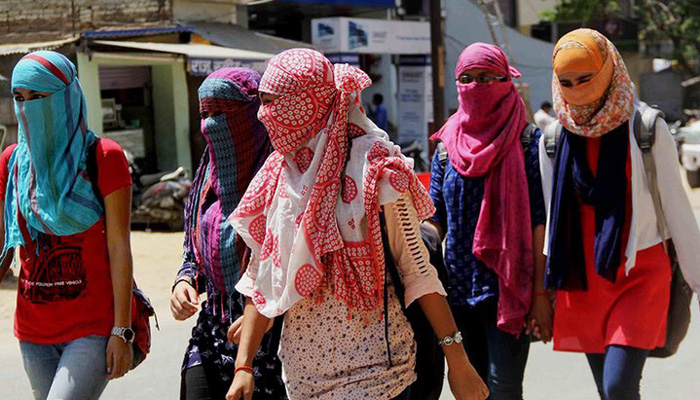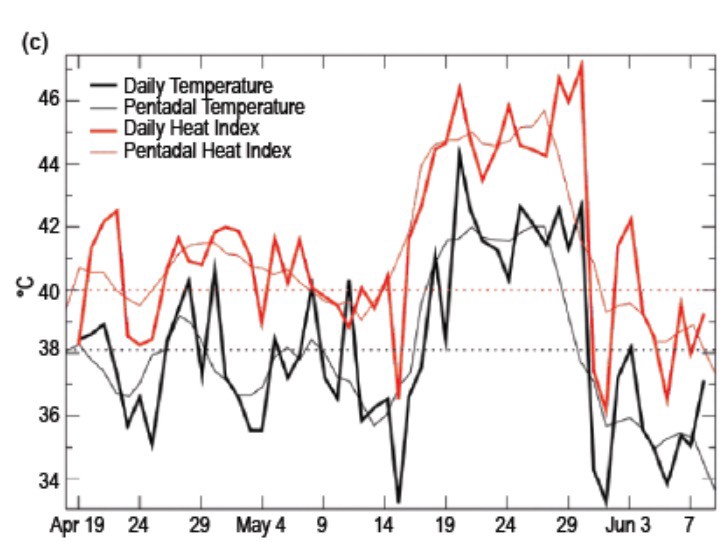
Photo: zeenews.india
The temperature in the summer is soaring day by day and the nights are becoming sleepless due to this soaring temperature. But in many countries, soaring temperature is more than sleepless nights. Sky rocketing temperature across northern and southern India has resulted in the deaths of more than 1242 people so far. Most of these deaths are caused by heatstroke and dehydration. The doctors point out that long exposure to extreme heat raises the body temperature to such a high level that it causes the over-heating of an individual’s protein cells adversely impacting the individual’s brain. Many of those dead are known to be daily laborers.

Photo :Medium
Reasons for the soaring temperature:-
- The vital reasons for heat waves is the occurrence of El Nino. It occurs in the Pacific coast of South America. It adversely affects the Indian monsoon. El Nino results in less rainfall and corresponding higher temperatures.
- The air circulation in clockwise create rain clouds. At present the atmosphere has anti-clockwise air circulation. It obstructs rain clouds. Therefore, the temperature level in various parts of Arabian Sea rose by 1 to 3 degree Celsius.
- Another reason for the rising temperature is primarily because carbon dioxide concentrations have increased 40 per cent since pre-industrial times. The result is that both the temperature and the oceans are going up.
- Soil erosion in floods also increased the chances of warmer temperature. The soft soil which absorbs the heat eroded in the flood. The remaining hard soil will create more heat.
- Glacial melting and increasing deforestation also adversely impact weather cycles.
- Old timers blame the rise in temperatures to unregulated construction activities, traffic pollution and increasing deforestation which has left large swathes of the Himalayan Mountain slopes without any covering.
Effects of Summer temperature on human body:-
- Long term, unprotected exposure to ultraviolet light from the sun can damage the retina of the eyes.
- People working in the soaring heat are at risk of heat exhaustion. Heat exhaustion is the body’s response to excessive loss of water and salt due to sweating. Symptoms of heat exhaustion include dizziness, weakness, irritability, thirst and heavy sweating etc. If heat exhaustion is left untreated for long, it can lead to heat stroke.
- Sunburns also occur due to excessive heat. General symptoms of sunburn include redness, swelling, blisters, nausea, fever and headache etc. Sunburns are widely recognized as one of the most common negative effects of too much exposure to heat.
- Heat rash also takes place during hot, humid weather. It often looks like red clusters of pimples or small blisters.
- The worst consequence of long term exposure to heat is the development of skin cancer. Because the sun damage to the skin develops over the years, the older you are, the greater the risk of developing skin cancer.
- We always associate wrinkles with aging, but sun exposure is a significant factor in their development. Ultraviolet light exposure also causes white and dark spots on the skin as it damages the surface cells.
How to tackle the problem of increasing Summer temperature :-
Heat Wave conditions can result in physiological strain, which could even result in sudden death. To minimize the impact of the heat wave and to prevent serious ailment or death because of heat stroke, the following measures are useful:
- We should listen to Radio, watch TV, read News paper for local weather forecast to know if a heat wave is on the way.
- We should drink sufficient water and as often as possible, even if we do not feel thirsty.
- We should wear lightweight, light-colored, loose, and porous cotton clothes. We must use protective goggles, umbrella/hat, shoes or chappals while going out in sun.
- While travelling, we must carry water with us.
- If we work outside, we should use a hat or an umbrella and also use a damp cloth on our head, neck, face and limbs.
- We should use ORS, homemade drinks like lassi, torani (rice water), lemon water, buttermilk, etc. which help to re-hydrate the body.
- We should recognize the signs of heat stroke, heat rash or heat cramps such as weakness, dizziness, headache, nausea, sweating and seizures. If we feel faint or ill, we must see a doctor immediately.
- We should keep our home cool, use curtains, shutters or sunshade and open windows at night.
- We should use fans, damp clothing and take bath in cold water frequently.
- We should arrange cool drinking water near workplace.
- We should caution workers to avoid direct sunlight.
- We should schedule strenuous jobs to cooler times of the day.
- We must increase the frequency and length of rest breaks for outdoor activities.
- We must pay additional attention to pregnant workers and workers with medical problem.
No scientist will jump to the conclusion that an extreme weather event is the direct result of climate change. Weather is a localized phenomenon to which the long-term climate trends contribute. The more greenhouse gases we put into the atmosphere, the warmer the climate gets and the more likely these extreme weather events become. The rise in global average temperature caused by climate change is the common denominator of these extreme weather events. Each region, however, has other factors contributing to its suffering. We should take care of our environment and plant trees to avoid the soaring temperature in the summer.

Writer Bio– Laksh Garg, 14 years old from Maur Mandi, Bathinda, Punjab.He is the participant of International Essay Competition, June, 2019.


